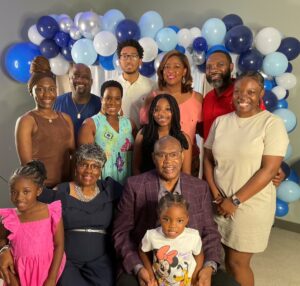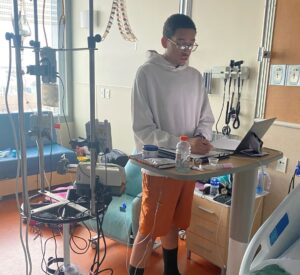‘Roll With the Punches’: Sickle Cell Patient Keeps a Positive Outlook on Life
| Sickle cell disease hasn’t made life easy for Xavius Hymes, 27, of Pine Bluff, but he hasn’t let it keep him from dreaming big. In fact, he uses the disease as fuel to keep going.
“If anything, I feel like sickle cell anemia has made me mentally stronger,” Hymes said in a YouTube video. “It’s definitely taught me to roll with the punches, and not letting your current situation be your outcome. There’s a lot more to you than what you’re going through at this moment. Don’t let it hold you back from experiencing life.”
Hymes was born with sickle cell anemia, sometimes called SS sickle cell because of the two “S” sickle cell genes inherited from each parent. It is the most severe form of the disease and often results in multiple pain crises every year.
For Hymes, weather is the most common trigger.
“Mostly it’s drastic weather changes for me,” Hymes said. “Let’s say it’s been 70 degrees for a couple of days, and then it drops to 40 or 30 [degrees] — that could cause me to have a crisis.”
That continued as he got older, affecting his ability to attend school and play sports.
“I missed quite a bit of school during the colder seasons,” Hymes said. “I got to play sports for a while until I got to 11th grade, and they suggested that I stop because of sickle cell.”
Hymes remembers having his first pain crisis when he was 5 years old, the same day as his biological father’s funeral. That was when he was a patient in the pediatric sickle cell program at Arkansas Children’s. He credits Suzanne Saccente, M.D., a pediatric hematologist/oncologist and associate professor in the Department of Pediatrics, and Angela Mull, RN, with his care.
Since transitioning to the UAMS Adult Sickle Cell Program, Hymes said the main difference is that he now takes a larger role in his own care. He often makes hospital trips himself, but his family helps make sure he’s recovering well. Checkups range from every three to six months.
“At this point, they kind of expect you to handle more on your own, to be preventative and stuff, versus when you’re a child, and they’re a lot more hands-on,” Hymes said.
Hymes was grateful to a number of people with the UAMS sickle cell team for his care, including nurses Stella Bowers, RN, and Rebecca Camp, APRN, as well as internal medicine doctors Hasan Rana, M.D., Fatima Khan, M.D., Nazish Malik, M.D., and his primary physician, Toni Middleton, M.D.
Sickle cell is more of a road bump for Hymes, who is determined to keep busy.
Hymes has been enrolled in a post-baccalaureate program through the UAMS College of Medicine that helps students apply to medical school. He also works at UAMS through the Division of Diversity, Equity and Inclusion, assisting with summer health programs. Eventually, he wants to become a physician to help fellow sickle cell patients and many others in need.

Hymes and his mother, Denise. He often makes hospital trips himself, but his family helps make sure he’s recovering well.Xavius Hymes
However, all of that has been on hold for the past year while Hymes has been receiving additional treatment at Children’s Hospital Colorado in Aurora, Colorado. The UAMS sickle cell team keeps up-to-date on his care there. His plan is to re-enroll at UAMS in the fall.
“I want to continue on and go to med school, and become a physician,” Hymes said.
Over the past three years, Hymes has been posting videos on YouTube chronicling his journey as a sickle cell patient. He records his doctors’ visits, showing every needle stick and IV. Sometimes he cracks jokes with the nurses while he waits for an infusion. Others show him in a hospital bed in the early morning hours. He dedicated one video to explaining his worst sickle cell crisis, where extreme constipation kept him from eating for five days.
“I wanted to show people they could still have a normal life with a chronic illness,” Hymes said in his first video. “They don’t have to surrender to that illness. Use it as a motivation, to push yourself to do more, which helped me a lot. Think of it as a motivation instead of a hindrance.”
There are still unpredictable, painful days that require hospital visits. Hymes said he only goes to the hospital as a last resort, when he can no longer control his pain at home.
There are also stigmas that many patients contend with. Sickle cell patients are often stigmatized as being drug-seeking, which Hymes said is frustrating.

“I can’t wait to be able to give back and repay the people who’ve poured into my life: my parents and grandparents, the doctors and nurses — everyone, really,” Hymes said.
“It’s unpredictable; we can’t control when we get sick or when we have pain,” Hymes said. “So, needing to get pain medicine and fluids — if we didn’t have to be there, a lot of us wouldn’t be there. Being looked at like, we’re just there for pain medicine. Of course we’re there for pain medicine, because when you’re in pain the only thing you want to be is out of pain.”
Hymes said keeping a positive outlook has helped him get through the hard times.
“You feel like you’re getting ahead or making forward progress, it seems like those moments are when you have a sickle cell crisis or something that pushes you back,” Hymes said. “After stuff like that happens, it’s important for me to keep a positive mindset so I don’t get stuck in a rut.”
In his free time, Hymes said he enjoys going to zoos and aquariums, which is something he’s making the most of during his time in Colorado. Once his treatment there is complete, he’s looking ahead to starting medical school and using his knowledge to help others.
“I can’t wait to be able to give back and repay the people who’ve poured into my life: my parents and grandparents, the doctors and nurses — everyone, really,” Hymes said. “I’d just like to show how much I appreciate everyone. I’m not sure exactly how, but I look forward to that the most.”

